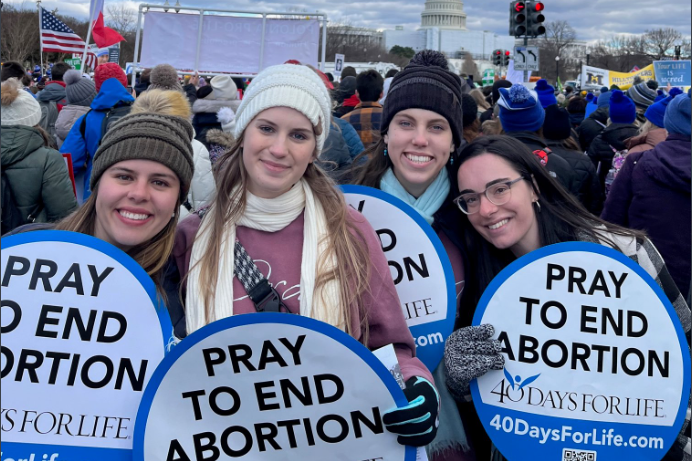You have to put it altogether to appreciate why the pro-abortion website rewire news group would run a story under the stern headline “Anti-Abortion Advocacy Is Rising on College Campuses.”
We already know that as a generalization, Gen Z—18 to 29— is the most conservative age group in decades. We also know that pro-abortion Vice President Kamala Harris barely beat President Trump, 52% to 46% among Gen Z voters but that 57% of men under 30 voted for Mr. Trump.
REACH PRO-LIFE PEOPLE WORLDWIDE! Advertise with LifeNews to reach hundreds of thousands of pro-life readers every week. Contact us today.
Newsweek’s Adeola Adeosun reported
Recent AtlasIntel polling shows President Trump’s approval rating among 18–29-year-olds has climbed to 52.7 percent in February, marking a substantial improvement [23 percentage points] since his January inauguration.
This demographic transformation challenges long-held Democratic Party assumptions about younger generations forming an “ascendant majority” that would secure their electoral future.
The conservative trend among Gen Z voters—especially young men—appears to be solidifying during Trump’s second term, potentially reshaping American politics for years to come.
Democratic pollster David Shor said on Ezra Klein’s podcast that
“This is the thing I am the most shocked by in the last four years—that young people have gone from being the most progressive generation since the Baby Boomers… to becoming potentially the most conservative generation that we’ve experienced maybe in 50 to 60 years.”
What rewire news group’s Anika Asthana adds is that
Right-wing groups have long seen universities across the U.S. as bastions of the left, reflective of the typical leftward skew of youth voting blocks. But anti-abortion advocacy groups have a small—and growing presence on college campuses.
Take Georgetown University’s Right to Life Chapter.
The club was “bare bones” in 2021, according to its event coordinator, Leah Raymond, but it has worked its way up to a membership of around 80 people. Raymond said the group is now flourishing.
“Membership is growing,” Raymond said. “There are just more conservative students willing to show their face.”
And that’s just a start.
It’s a trend at other universities, too. In the past academic year, Princeton University’s Pro-Life club has grown as well, reaching more than 80 members, making it one of the larger student groups on campus. And at Ohio University, Olivia Barnes and Olivia Kaiser started Bobcats for Life after the fall of Roe.
The club estimates that it has grown from two founding members to around ten members. Other clubs, like Choose Life at Yale (CLAY), have increased their on-campus activity.
Catholic universities have also seen a strong increase in pro-life [“anti-choice”] membership, Asthana writes.
Jackie Nguyen, president of the University of Notre Dame’s Right to Life club said it currently has more than 900 members on its email list and GroupMe, and that last year the group had about 700 members. The club’s website claims it has more than 700 members, making it the country’s biggest anti-choice student group.
However, unsurprisingly, as Asthana proceeds, her relatively unbiased coverage bites the dust. Clubs “claim” to “host diaper drives, offer babysitting services, fundraise for parents who cannot afford child care, and volunteer at anti-choice pregnancy centers (also called “crisis pregnancy centers”), which aim to dissuade pregnant people from seeking abortion care.”
Apologetics? Well….
Anti-abortion student groups also arm themselves with “pro-life apologetics”—or, “the arguments and defenses that we have for our position,” Barnes said. She added that these apologetics promote the idea that “babies are provably, scientifically alive” and that “innocent human life has a right not to be forcibly killed.”
Sounds solid to me, the kind of case for life that all educated pro-lifers can make. But, according to Asthana,
Apologetics, however, are not backed in science or fact—in this case, they are largely religious justifications for anti-abortion arguments
And it goes downhill from there.
Pro-life groups— “anti-choice groups” —are flourishing because the rise of “the alt-right”; they are “overwhelming white”; and probably deserve to “face a variety of pushback from students, ranging from polite discourse to destruction of chalk displays and signs. Ohio University’s club has faced strong pushback from the students, with Olivia Barnes [co-founder of Bobcats for Life] reporting that club leadership contacted the police at times due to the perceived threat of harm.”
After all, “We are the most controversial club on campus,” said Philip Cooper, president of the University of New Hampshire’s (UNH) Students for Life.
The story ends with a comforting conclusion for the readers of rewire news group:
Princeton Pro-Life’s increased presence and the country’s broader political shift is causing PSRJ [Princeton Students for Reproductive Justice] to re-examine its advocacy and services.
“Our approach is to be the louder voice, putting our energy into our own efforts, and making sure we’re reaching as many people on campus as possible,” [PSRJ President Sam] Yamashita said.
We’ll see who wins out. After all, campuses are nothing if not open-minded, right?
LifeNews.com Note: Dave Andrusko is the editor of National Right to Life News and an author and editor of several books on abortion topics. He frequently writes Today’s News and Views — an online opinion column on pro-life issues.
The post Abortion Activists Freak Out Because Gen Z is Becoming More Pro-Life appeared first on LifeNews.com.

